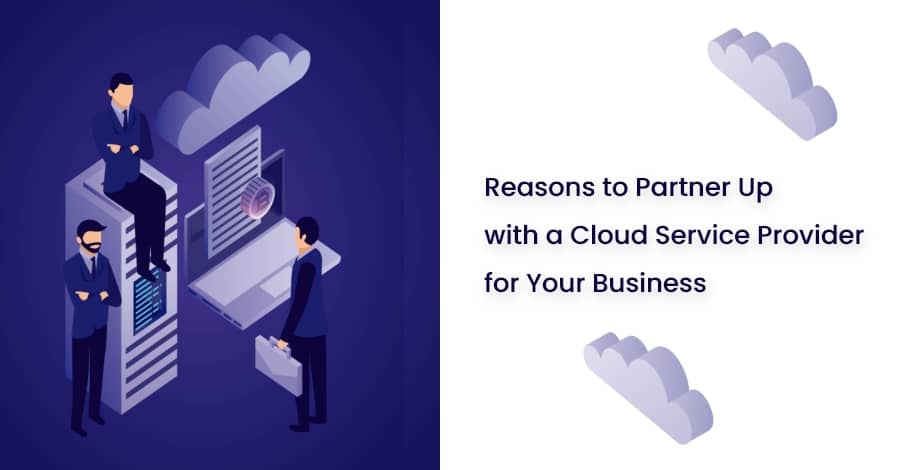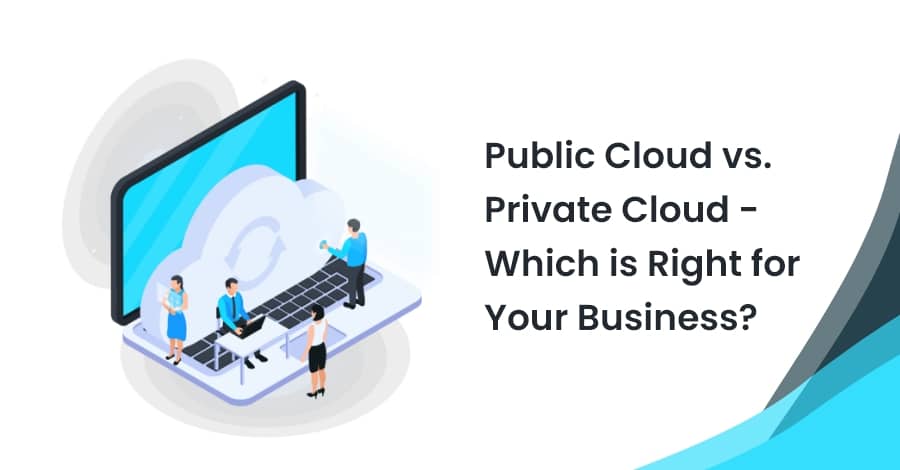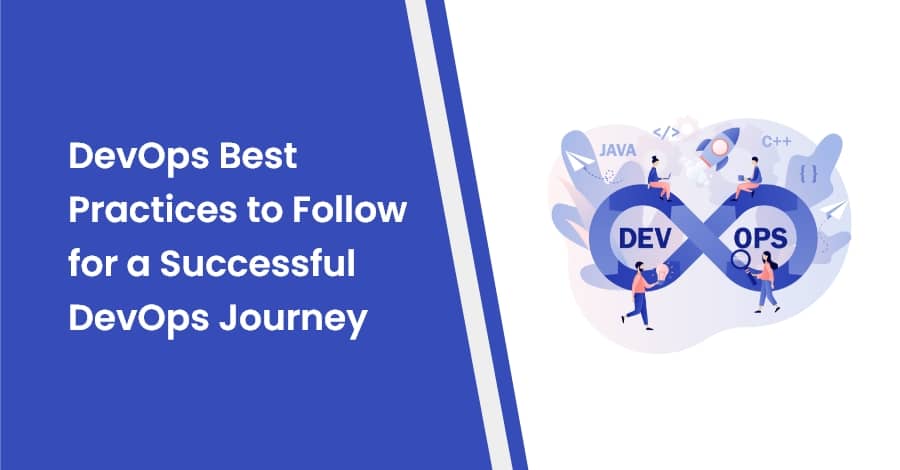
05 Dec Benefits of Cloud Service Provider for Your Business
05 December 2022

Software-as-a-service (SaaS), hybrid, and private cloud solutions are all the rage today. But what exactly do these cloud acronyms mean? And how can a service provider help your business implement technology that meets your needs without breaking the bank? In this blog post, we’ll explain why partnering with a cloud service provider is a great way to get the most out of your organization’s digital transformation efforts. These partners can help you navigate the complexities of implementing technology while assisting you in meeting business goals and reducing costs.
Let’s take a look at eight reasons why partnering with a service provider is an optimal strategy for your business.
- SaaS Is Becoming the New Normal
SaaS solutions have been around for a while now. But recently, they’ve drawn a lot of attention. One reason for that is that they’re highly scalable, meaning that they’re designed to grow with your organization as you add more employees and onboard more customers. It’s also easy to onboard users with SaaS because the solution is accessed online. With SaaS solutions, there’s no need to purchase, install, and maintain servers. That makes them a very attractive option for businesses of all sizes.
Another benefit of SaaS solutions is that they offer greater flexibility in terms of pricing. Instead of paying for the entire solution, you pay for each service you use. This means that if you need a new function or feature, you don’t have to wait for your vendor to deliver it. You can simply include it in your current plan. SaaS solutions also come with a built-in customer support system so you can receive assistance whenever you need it.
- Hybrid Cloud Is a Mix of On-Premises and Cloud Services
While some companies are moving all of their services to the cloud, others are keeping some of their data on-premises. Hybrid cloud solutions are designed to address the needs of both types of organizations by providing a mix of on-premises and cloud services. Hybrid solutions enable businesses to implement digital transformation initiatives while retaining control over sensitive data. This type of solution is well-suited for an organization that isn’t quite ready to fully offload its IT operations to the cloud but still wants to take advantage of a number of cloud-based services.
Another advantage of a hybrid cloud solution is that it allows you to scale your technology as your business grows. You can add capacity in the form of additional servers to handle sudden spikes in demand or add capacity across different departments. Hybrid solutions allow you to retain control over your organization’s data and meet compliance requirements.
- Greater Data Control is Offered by Private Cloud
A private cloud solution gives you greater control over your data. In a public cloud environment, your data is hosted on a third-party server in a location that may be thousands of miles away from your company’s headquarters. A private cloud solution lets you host your data on-premises and use cloud-based services to meet specific business needs. It also gives you greater control over uptime and scalability. With a public cloud solution, you don’t have any say over the location of your server and there’s nothing you can do if service is interrupted. With a private cloud solution, you have control over the hardware and can make adjustments as needed.
A private cloud solution is ideal for an organization that has strict compliance requirements. You can access your data from anywhere, but it remains under your control. And with a private cloud solution, you have a better understanding of how much the solution will cost you to implement and maintain.
- A Good Service Provider Knows Your Business
Partnering with a cloud service provider gives you access to a wealth of technology options. And you must choose which ones to employ. With this many choices, it can be challenging to determine which technology best meets your business needs. A service provider can be helpful in this situation.
A good provider knows your business and can offer advice on the best types of technology to use. It can also help you implement and use the technology so you’re getting the best results possible. A service provider also knows which technology options are best at addressing specific business objectives. For example, it can help you determine which best practices to follow when onboarding new users. It can also help you select the right tools to help you manage projects, track progress, and meet milestones.
- You Can Test Out New Technologies With a Cloud Service Provider
If you’d like to try a new technology or a particular software solution but aren’t ready to make a full-blown commitment, a cloud service provider may have an option for you. Many providers offer free trials so you can test out one of their solutions before deciding whether or not to continue using it. This is helpful for organizations that are incorporating digital transformation initiatives but aren’t sure which technologies would be the best fit for their specific needs.
A provider can help you select the technologies that align with your business objectives and are likely to bring value to your organization. In addition to free trials, providers may also offer managed services. Managed services include a wide range of support options. Some providers offer ongoing advice and coaching while others offer a managed service that includes everything from design and development to hosting and support.
- You’ll Get Expert Advice and Guidance From a Service Provider
When you partner with a cloud service provider, you’re not just getting access to technology and support. You’re also getting access to expertise. A provider offers guidance on how best to use its services to meet your business objectives. It can also help you select the right tools to accomplish your goals.
For example, a provider can help you determine the best way to onboard new employees and manage their accounts. It can also assist you with managing projects and tracking employee performance. When you work with a provider, you’ll have access to experts who know the ins and outs of their technologies. They can assist you when you need help and respond to issues when they arise.
- You Can Reduce Operational Costs with a Service Provider
A cloud service provider can help you reduce operational costs by taking on some of the responsibilities that are currently part of your IT department’s job description. Providers often handle hosting and monitoring services, including help desk support. In addition, some providers offer managed services that include a wide range of technology implementation and support services. When you work with a provider, you can offload some or all of your IT operations to its team. This frees up your employees to focus on the work that matters most to the organization.
When it comes to reducing costs, it’s important to find the right provider. You want to look for a team that’s experienced enough to do the job well but also cost-effective. With that in mind, it may be helpful to hire a consultant who can assist you with vetting providers and selecting the best one for your organization.
Bottom line
When you partner with a cloud service provider, you have access to a wealth of technology options. You can also benefit from reduced operational costs and expert advice and guidance from a provider. Plus, you can reduce your costs even further by purchasing in-out call services. These types of service contracts offer fixed monthly fees for a range of IT services, including help desk support and application management. They’re a great way to manage costs because you pay for them regardless of how much work your team needs.
Looking for the right cloud service partner? Contact us for proper guidance and tailored made solutions.
Our Related Posts
Public Cloud vs. Private Cloud – Which is Right for Your Business?
Digital transformation is happening at breakneck speed. Companies are looking to leverage the power of digital.….
DevOps Best Practices to Follow for a Successful DevOps Journey
DevOps is a methodology that brings together the entire organization, from strategy to execution.….
Windows 365 vs. Azure Virtual Desktop: Which is right for your organization?
Today, a lot of businesses are addressing challenges with a hybrid workforce and preparing ….





Sorry, the comment form is closed at this time.